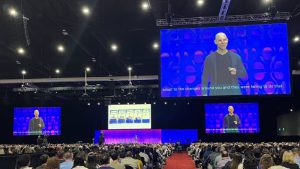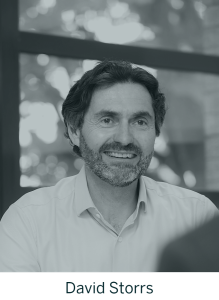David Storrs reflects on the key themes from his attendance at this year’s hugely insightful ATD Conference in San Diego.
Each year ATD boasts an impressive range of presentations, workshops and panels with the promise that the event is the best place for learning professionals to “reconnect, recharge, learn, and network”.
For many, the biggest draw was the headlining keynote speaker – Adam Grant, who offered refreshing perspectives that saw the social media backchannel buzzing with live tweets and quotes from the sessions.

As business leaders, we need to get better and faster at rethinking
Few in the L&D or talent development field draws a crowd quite like Adam Grant and in his keynote session ‘Think Again: The Power of Knowing What You Don’t Know’, he certainly lived up to the hype.
In a wide-ranging and captivating keynote, he covered themes such as challenging upwards, accountability, rethinking and unlearning, decision-making, leadership styles, feedback and psychological safety (a key theme across the event this year).
Grant argued that leaders are often good at thinking but not rethinking. Rethinking requires going against conventions, challenging norms, and getting things wrong – hence for many, this can feel too uncomfortable. This is why we need to have a strong ‘challenge network’ when seeking feedback on performance or decisions. These people are unafraid to provide constructive honesty over endless conformance.
Grant proposed that we spend an hour a week thinking about the way we do things currently and using that time to identify what needs to change. In Grant’s words: “Weak leaders shoot the messengers and strong leaders promote the messengers…let’s get better and faster at rethinking.”
AI can enhance what we do in learning, but we must use it with caution
Having climbed an impressive twelve places up the rankings in Donald H Taylor’s Global Sentiment Survey, it was no surprise to see generative AI as one of the most popular themes at ATD 2023. Conversations were mainly speculative over the potential of AI and what could happen in the future – no one has the answers yet, but we know developments are happening rapidly.
There’s no doubt that AI will affect every aspect of L&D in future, from instructional design to learning management systems and delivery methods. Within a few years, we might expect it to impact a merging of technologies. Could AI with VR, for example, have the potential to create highly realistic, in-the-moment behaviour-based scenarios and deliver solutions at scale? We will leave the tech wizards to answer this!
It will be particularly interesting to see if AI makes its way into coaching. One presenter at ATD talked about how they used both real coaches and AI versions in their coaching practice. Whilst the experience was rated equal by the coachees, there was concern about the potential of glitches with the AI version. There is also the risk that the company could lay itself open to litigation from a coachee experiencing a potentially career-derailing impact as a result of this method, which highlights how we must approach it with caution.
In essence, developments in AI will enable us all in many ways in the coming months. But in the near future, the step change will probably be in the domain of the large corporates who will likely develop their own versions to solve their security challenges. The truly transformational impact will undoubtedly happen for all of us in L&D. And by ATD 24 we should have a clearer idea on how this revolution will play out in our profession.

Learner engagement requires time, space and psychological safety
Common themes across exhibitors, presentations and conversations with attendees were the subjects of psychological safety, learning in the flow of work and learner engagement.
‘Build it and they will come’ simply doesn’t ring true in the context of learning and development, no matter how impressive your technology is. The delivery method won’t automatically guarantee engagement. Instead, we need to go deeper than this and consider the cultures we are creating.
People need to be aware of learning opportunities, understand the relevance to their daily lives and be part of a culture that makes time and space for learning. They need psychological safety to know they can ask questions, share ideas and apply learning without fearing the consequences of failure. No matter how impressive a vendor’s feature set may sound, true engagement starts with a people-first approach and a supportive culture.
In the context of learning in the flow of work, it will be interesting to see how AI enhances access to highly personalised learning on the job, reducing the pressure that stems from a lack of time for learning and the need for constant productivity. While AI tools will help to save time and streamline the process, we still need to be mindful that we are actually supporting the skill of self-directed learning rather than creating workforces that are highly dependent on an overwhelming number of tools.
And this reiterates a key message from ATD 2023: while AI has potential and the learning landscape is fast-evolving, we need to be taking into account how we can use it to enhance, rather than replace, the work we do to get the best out of our people.
We look forward to continuing these conversations with our clients and partners over the course of the year as we all navigate this inflection point in our industry.

David Storrs leads the HPC team as Managing Director and is a key relationship builder amongst many of HPC’s clients.
David is a skilled consultant, facilitator and coach who has many years of experience in the arena of leadership and management. He has a sound awareness and understanding of the specific leadership challenges that face organisations, teams and individuals. He adds valued input into the scoping, design and evaluation of key client solutions, which he oversees at a strategic level.
Prior to taking over HPC in 1999, David spent the early part of his career in the navy followed by a 7 year term in corporate banking with Bank of Ireland.
david.storrs@wearehpc.com
Connect with David on LinkedIn >>>
Connect with HPC on LinkedIn >>>